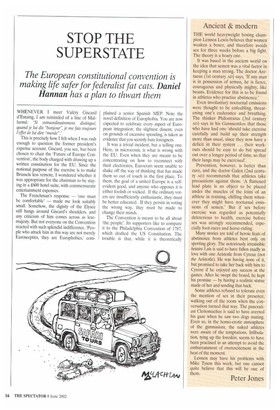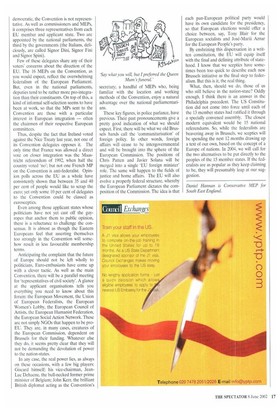STOP THE SUPERSTATE
The European constitutional convention is
making life safer for federalist fat cats. Daniel Hannan has a plan to thwart them
WHENEVER I meet Valery Giscard d'Estaing, I am reminded of a line of Mallarme: 'Si extraordinairement distingue, quand je lui dis "bonjour", je me fats toujours l'effet de lui dire "merde".'
This is precisely how I felt when I was rash enough to question the former president's expense account. Giscard, you see, has been chosen to chair the 'Future of Europe Convention', the body charged with drawing up a written constitution for the EU. Since the notional purpose of the exercise is to make Brussels less remote, I wondered whether it was appropriate for the chairman to be staying in a £600 hotel suite, with commensurate entertainment expenses.
The Frenchman's response — 'one must be comfortable' — made me look suitably small. Somehow, the dignity of the Elysee still hangs around Giscard's shoulders, and any criticism of him comes across as lesemajesty. But not everyone on the Convention reacted with such splendid indifference. 'People who attack him in this way are not merely Eurosceptics, they are Europhobics,' com plained a senior Spanish MEP. Note the novel definition of Europhobia. You are now expected to celebrate every aspect of European integration: the slightest dissent, even on grounds of excessive spending, is taken as evidence that you secretly hate foreigners.
It was a trivial incident, but a telling one. Here, in microcosm, is what is wrong with the EU. Even when they are meant to be concentrating on how to reconnect with their electorates, Eurocrats seem unable to shake off the way of thinking that has made them so out of touch in the first place. To them, the goal of a united Europe is a selfevident good, and anyone who opposes it is either foolish or wicked. If the ordinary voters are insufficiently enthusiastic, they must be better educated. If they persist in voting the wrong way, they must be made to change their minds.
The Convention is meant to be all about 'the people'. Its supporters like to compare it to the Philadelphia Convention of 1787, which drafted the US Constitution. The trouble is that, while it is theoretically democratic, the Convention is not representative. As well as commissioners and MEPs, it comprises three representatives from each EU member and applicant state. Two are appointed by the national parliaments, the third by the governments (the Italians, deliciously, are called Signor Dini, Signor Fini and Signor Spini).
Few of these delegates share any of their voters' concerns about the direction of the EU. The 16 MEPs on the Convention, as you would expect, reflect the overwhelming federalism of the European Parliament. But, even in the national parliaments, deputies tend to be rather more pro-integration than their constituents. On top of this, a kind of informal self-selection seems to have been at work, so that the MPs sent to the Convention are those with a particular interest in European integration — often the chairmen of their respective European committees.
Thus, despite the fact that Ireland voted against the Nice Treaty last year, not one of its Convention delegates opposes it. The only time that France was allowed a direct vote on closer integration was the Maastricht referendum of 1992, when half the country voted `no'; but not one French MP on the Convention is anti-federalist. Opinion polls across the EU as a whole have consistently shown that between 35 and 40 per cent of people would like to scrap the euro: yet only some 10 per cent of delegates to the Convention could be classed as eurosceptics.
Even among those applicant states whose politicians have not yet cast off the guyropes that anchor them to public opinion, there is a reluctance to challenge the consensus. It is almost as though the Eastern Europeans feel that asserting themselves too strongly in the Convention will somehow result in less favourable membership terms.
Anticipating the complaint that the future of Europe should not be left wholly to politicians, Euro-enthusiasts have come up with a clever tactic. As well as the main Convention, there will be a parallel meeting for 'representatives of civil society'. A glance at the applicant organisations tells you everything you need to know about this forum: the European Movement, the Union of European Federalists, the European Women's Lobby, the European Council of Artists, the European Humanist Federation, the European Social Action Network. These are not simply NGOs that happen to be proEU. They are, in many cases, creatures of the European Commission, dependent on Brussels for their funding. Whatever else they do, it seems pretty clear that they will not be demanding the devolution of power to the nation-states.
In any case, the real power lies, as always on these occasions, with a few big players: Giscard himself; his vice-chairman, JeanLuc Dehaene, the bull-necked former prime minister of Belgium; John Kerr, the brilliant British diplomat acting as the Convention's 'Say what you will, but I preferred the Queen Mum's funeral.'
secretary; a handful of MEPs who, being familiar with the location and working methods of the Convention, enjoy a natural advantage over the national parliamentarians.
These key figures, in police parlance, have previous. Their past pronouncements give a pretty good indication of what we should expect. First, there will be what we old Brussels hands call the `communitarisation' of foreign policy. In other words, foreign affairs will cease to be intergovernmental and will be brought into the sphere of the European Commission. The positions of Chris Patten and Javier Solana will be merged into a single 'EU foreign minister' role. The same will happen to the fields of justice and home affairs. The EU will also evolve a properly federal structure, whereby the European Parliament dictates the composition of the Commission. The idea is that each pan-European political party would have its own candidate for the presidency, so that European elections would offer a choice between, say, Tony Blair for the European socialists and Jose-Mann Aznar for the European People's party.
By enshrining this dispensation in a written constitution, the EU will equip itself with the final and defining attribute of statehood. I know that we sceptics have sometimes been too quick to describe each new Brussels initiative as the final step to federalism. But this is it, the real thing.
What, then, should we do, those of us who still believe in the nation-state? Oddly enough, I think there is an answer in the Philadelphia precedent. The US Constitution did not come into force until each of the 13 member states had ratified it through a specially convened assembly. The closest modern equivalent would be 15 national referendums. So, while the federalists are beavering away in Brussels, we sceptics will be spending the next 12 months drawing up a text of our own, based on the concept of a Europe of nations. In 2004, we will call for the two alternatives to be put directly to the peoples of the 15 member states. If the federalists are as popular as they keep claiming to be, they will presumably leap at our suggestion.
Daniel Hannan is Conservative MEP for South East England.























































































 Previous page
Previous page